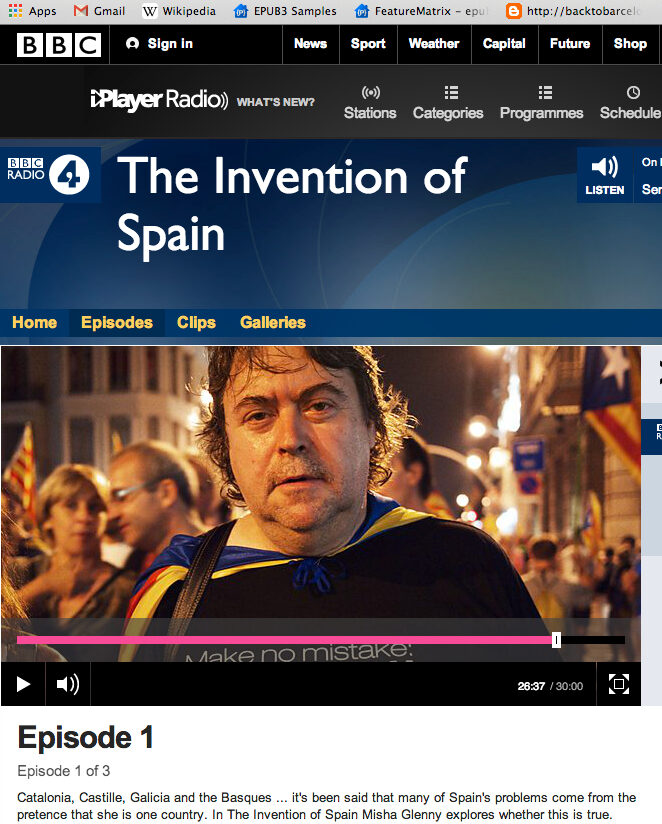08.04.2014 - 13:22
Catalonia, Castille, Galicia and the Basques … it’s been said that many of Spain’s problems come from the pretence that she is one country. In The Invention of Spain Misha Glenny explores whether this is true. Three documentaries, from 1492 to 1898, from Columbus to El Desastre, tell the story of the rise and fall of an empire. But they also reveal the fractured state of a nation, both in history and now.
Basque journalist Iñigo Gurruchaga
“The idea of 1492 I think it was important. Because I think it defines many things about the shape of Spain. Because you have to be of pure blood, not Moorish or Jewish blood. And you have to be a Catholic. So the birth, the embryonic idea of Spain is rooted in the idea of exclusion. And that I think is a very nasty thing to have in your history. Something that makes you think. For a Basque, as were talking about the Basque Country, you can see that the origin of the idea of a separate identity of Basqueness comes from 1492. From the claim of being people of the purest blood.”
Historian Felipe Fernández Armesto
“There’s a paradox here. According to orthodox economics, Marx aside, having an empire should lead to industrialization and capitalism and all that sort of stuff. But in Spain’s case, it’d didn’t, I think, because of this siren, this illusion that the monarchy didn’t need to reinvest. There was always going to be more bonanza forthcoming.”
So this was like easy money?
“It wasn’t eay for the guys digging the silver out of the mines. We should spare a thought for them. But I think for the bankers, it looked like easy money, and when bankers go after easy money, everybody suffers.”
“Everwhere else in the world, the 11th of September is remembered for the attack on the World Trade Center in New York, but not in Catalonia. The Diada Nacional de Catalunya, commemorates the fall of Barcelona in 1714 after a seige by French and Castillian forces, which had lasted over a year. And as a consequence Catalan political and cultural identity, among the most tenacious in Europe, is linked inextricably to this monument here, in the center of Barcelona.
All around me I can see the press, I can see dignataries of Barcelona and Catalonia, and of course, thousands of Catalans who’ve come here to celebrate this day in honor of the man whose statue is here, Rafael Casanova, who was the mayor of Barcelona in 1714 and who led the heroic but failed last stand.
… After the defeat, what happens to Catalonia then?
After the war, the new king abolished the identity of the Catalans by decree. It’s called the “Decree of Nova Planta” and it meant for the Catalans that they abolish Catalan rights and the Catalan Constitution.”
“In contrast to the Spanish National Anthem which has no words because no one could agree on them, the Catalan National Anthem certainly does. It’s called “The Reapers”. And they sing “Catalonia, triumphant shall again be rich and bountiful. Drive away these people who are so conceited and so comtemptful.”
The defense of Barcelona in 1713 ad 1714 was heroic but was destined to fail before it had begun. The British, who had promised earlier to help the Catalans, had cut and run. The main French war aim, a union under the Spanish and French crowns, was defeated, although France remained a great continental power. Spain lost all its European territories, in the Netherlands, as well, of course, as Gibraltar. The principle of the balance of power was established in Europe but naturally there were some losers. First and foremost, the Catalans. The War of Spanish Succession had collapsed several very different struggles for international supremacy with a civil war on the Iberian peninsula. And Catalonia was made to suffer. It’s long-cherished institutions of autonomy were swept away by the new Borboun monarchy. This may have been the severest of defeats for Catalonia national aspirations but as I can see today in Barcelona, the symbol would reemerge time and again as this new Spain attempted to adapt to a modern world for which it was not terribly well suited.”
Felipe Fernández-Armesto: “I think the reason the Empire collapses is because of the French Revolution”



